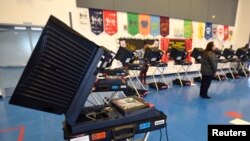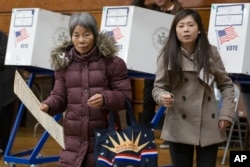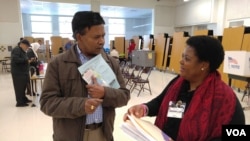A newly released survey of U.S. voters and poll workers suggests that a slender majority of Americans say they generally trust the accuracy of voting systems and the count, but fully 20 percent do not have confidence in the national election voting tally.
The survey of some 1,000 voters and more than 500 polling place workers and volunteers was sponsored by Smartmatic, one of the world’s oldest and largest providers of electronic voting systems.
In addition to the one-fifth of voters who said they do not trust the national vote count, a whopping one-third of all voters surveyed said they have “concerns” about the voting technologies in their specific voting location.
“It’s an interesting combination [of results],” said Antonio Mugica, the founder and CEO of Smartmatic. “The U.S. is a pioneer in voting technology, but at the same time it has let its infrastructure age beyond what would be advisable. You have now systems that are 10 to 15 years old in many counties, so the time is right for an upgrade — that’s been widely agreed to by election officials,” said Mugica.
Both voters and poll workers apparently agree. Eighty percent of voters, and 90 percent of elections officials, said they believe upgrading and improving voting systems nationwide would strengthen confidence in the national vote - no doubt music to the ears of companies like Smartmatic, which could stand to profit from such an investment.
Regarding the near unanimity of poll workers responses, Mugica says he’s not surprised. “Poll workers are extremely important; they’re the ones running the elections on Election Day,” he told VOA. “They’re the ones in the front lines, so they’re views are extremely important to any voting system.”
African-Americans, more than any other group surveyed, said the voting system and process where they vote was “time-consuming and inefficient,” by 35 percent. That compared to just 25 percent of voters overall – a figure that surprised Mugica.
“That wasn’t necessarily something that we expected,” he said.
In an interesting turn, voters expressed the greatest confidence in the voting system that they specifically use. For example, voters who use paper ballots have the most confidence in that system, while 86 percent of voters who use electronic systems said those were the most trustworthy.
“The good news is that people feel more comfortable using voting machines; they like it better and they have more trust in counting, even recounts,” Smartmatic CEO Antonio Mugica said. “Machines are very precise; people are very inaccurate.”
Many cyber-analysts are considerably less sanguine about the security of electronic systems. One analyst recently told VOA that such systems in the U.S. are “painfully vulnerable” to hacking and cyber-attack.
But Mugica dismisses such statements by “self-appointed experts.”
“They say ‘look how easy it is to hack the machine,’ but essentially they’re replacing the guts of the machine with a new set of guts,” Mugica told VOA. “In reality, that’s not hacking. That’s like taking a Boeing plane and swapping the engine out with a popcorn maker. But because it does strike to the fears of the public it gets repeated by the media.”







